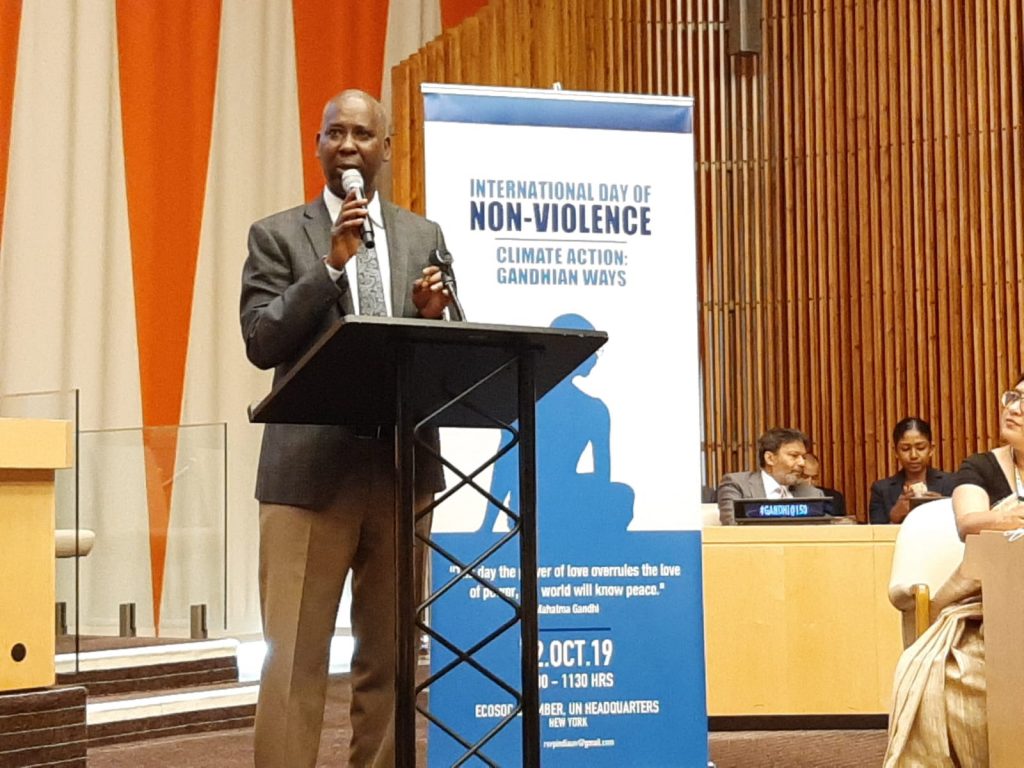– As delivered –
Statement by H.E. Tijjani Muhammad Bande, President of the 74th Session of the United Nations General Assembly
2 October 2019

Excellencies,
Ladies and gentlemen,
On this really important occasion, the birth date of Mahatma Gandhi who would have been 150 years old if he was alive today.
Given the wisdom of the General Assembly in passing a resolution to celebrate and mark that day as the International Day of Non-violence, I’m really honoured to have the opportunity to make a few remarks as the President of the General Assembly.
It is difficult, ladies and gentlemen, to say anything new about Gandhi. I do not know any school child anywhere in the world who has not been inspired by the resoluteness of Gandhi; the idea that the greatest courage is really to be non-violent.
For the United Nations, almost everything that is fundamental that we stand for has prefigured in the work, life and thought of Gandhi.
Let me mention just a few:
The idea of rights is fundamental. In the evolution of Gandhi as a lawyer, and I say evolution because he was a lawyer in South Africa, as the regime was beginning to have ever more restrictive laws before formal apartheid was agreed to in 1948. All the building blocks of apartheid were being built around the time Gandhi was practicing in South Africa.
He fought to defend individuals who had nothing but simply their truth. This was the evolution of a thinker.
You go from that to see the crafting of the Charter, how rights are fundamental. Look at the issues of respect for nations and for human beings regardless of their circumstance, regardless of size of nation if we are dealing with nations, you saw how Gandhi lived it.
Look at the question of today – and I endorse fully what my brother Syed (the Permanent Representative of India to the United Nations) has stated. The connection between Gandhi and what today is called Climate Activism is clear. You recall we’re dealing with the 1930s and 1940s, and look at what was stated:
“The earth, the air, the land and the water are not an inheritance from our forefathers but on loan from our children.” This is absolutely stunning.
I imagine that no normal human being will have a loan from his child and destroy it – I imagine so.
Now the whole question therefore, of connection between Gandhi’s thoughts and actions and our current world should be understood.
Let simply reflect a bit more concerning the fundamental question of today relating to climate action simply relate around what do we produce, how do we produce things and how do we distribute these things?
Let me simply state here that we have a lot to learn from this figure and the world must continue to deal with non-violence including the battle to get us out of our penchant for thinking that the sharper we make our weapons, the healthier or safer we are, this is a fallacy
The whole crisis we are facing relating to climate is because we produce in ways that are permanently destructive and almost irreparably so. This is the crux of the matter.
And when climate activists last week kept pushing that something needs to be done, they are referring to the idea of how we destroy as if there shouldn’t be tomorrow.
Then the whole question of what exactly is it we produce anyway? How much of it do we really need? The whole question, therefore, of producing simply because you can produce, whether you need, or you don’t; the whole question of producing probably five times the food we need and then dumping 80 per cent of it while 815 million people are hungry.
That is still the whole question of the climate issue.
Next is the issue of distribution.
What you do produce, just imagine, within countries, the inequalities are there. Forget about even inequalities among the regions, pick any country and look at what resources are controlled by, let’s say, the first 20 per cent, then you ask how is it possible we can have sustainability?
When you talk of conflict today, the way we produce, what we produce, how we produce are connected to conflict, whether you like it or not, in all countries.
Therefore, for us as an assembly, there is no better hero than anyone who says: No to violence; Yes to respect; Yes to equality and Yes to empathy.
These are the crises that bedeviled our world today. A reflection from a figure born 150 years ago is the best way for us to bring ourselves away from precipice. Can we do it? Yes, we can.
Just imagine the frail figure of Gandhi and look at the mighty battle he led – I didn’t say he fought because he always was connected to people.
Gandhi didn’t lead alone; Gandhi led with others. The whole question, therefore, of connections is critical in bringing about social justice.
And he led despite his frail frame, he was a very strong figure and a forgiving one, if you should see how he died.
Let me simply state here that we have a lot to learn from this figure and the world must continue to deal with non-violence including the battle to get us out of our penchant for thinking that the sharper we make our weapons, the healthier or safer we are, this is a fallacy.
Let me thank you for the opportunity to speak here today.
Thank you very much.